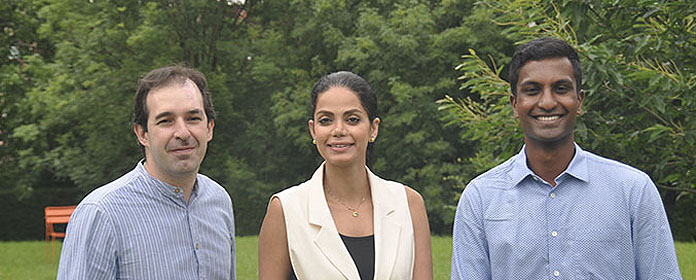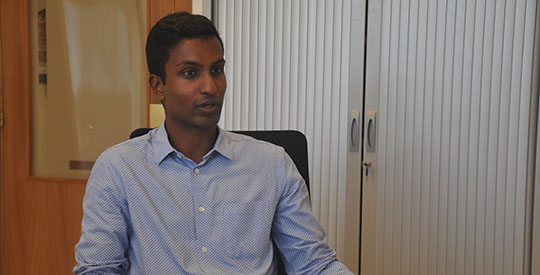News
LATEST NEWS AND EVENTS FROM THE SCHOOL OF ENGINEERING
"We build scaffolds to help cardiac cells grow."
Karthik Prasad, the biomedical engineer and his card Mugi

We chatted on Thursday evening at Colegio Mayor Ayete. Karthik Prasad had just returned from Pamplona, more precisely from research center Applied Medicine at the University of Navarra, where he has carried out part of his biomedical engineering project directed by Tecnun professorJacobo Paredes. Karthik had to finish packing his bags because he was flying via London to Galway City, Ireland. There he would attend a meeting sponsored by the Whitaker Fellowship organization, which awards the scholarships he earned in order to realize his dream. He would then return to San Francisco. On August 1, he will begin medical school at UC Irvine, California.
Where do we help the growth of cardiac cells?
Here. Between Tecnun and the research center Médica Aplicada on Avenida Pío XII in Pamplona. Although the idea arose at campus of the University of Berkeley, California, through the contact that I initiated with my professor Jacobo Paredes and other people from department of Biomedical Engineering.
You have used the word 'scaffolds' in telling me about this superb adventure.
Yes, yes, to help the growth of these cardiac cells we need to provide them with the context, the structure where they can develop. And those are the scaffolds. You can imagine that they are of a minimum size, built with nanofibers known as 'electrospun' or 'electrospinning'. We could say that we prepare 'electrospinning mattresses' for the cells to grow on their own (more or less). We are, precisely, in that first phase of pure biomedical engineering: the manufacture of the equipment, of the machine.
Place us, please, in the transcendence of cardiac cells developing on their own.
I'm sure you can imagine it. Therapy with these cells as a strategy to regenerate damaged tissues is one of the most promising areas in the treatment of diseases with little or no hope of cure by drugs, by-passes or stents.

Understood.
Until recently, it was believed that these cells could not grow on their own, but now we know that they do, and so it will turn out that therapies that apply them will promote endogenous repair.
Endogenous repair'?
They will help the damaged tissue repair itself through the release of 'paracrine factors' such as proteins and genetic materials.
Fascinating. As much as you and I are talking about it in Spanish and English in a conference room of Colegio Mayor Ayete. Who are you? Where do you come from, where are you going?
I was born in Kochi or Cochin, a city in the state of Kerala, India, and one of the most important ports in the country. When I was three years old, I moved with my parents to San Francisco, one of the most multiethnic, multicultural and liberal places on Earth. I like tennis. I want to be a surgeon...
I thought you were studying Biomedical Engineering?
In the United States, to become a doctor you have to study for four years at Degree , then medicine for another four years and then specialization, which can take another four or five years. Before deciding to become a cardiologist or surgeon, I wanted to focus on something very specific. That is why I chose Biomedical Engineering.
And San Sebastian, why?
I met Jacobo Paredes at UC Berkeley. Him and his project with cardiac cells. I got a scholarship Whitaker to study outside the United States. I decided to come here because I know that in my work as a doctor in North America I will need to know Spanish because many of my patients will be Hispanic. I did not know that there was another language. I found out on the bus that brought me from the airport.
¡¡??
I asked the driver for a ticket to San Sebastian and he said 'Ah, to Donostia'. I insisted that no, I was going to San Sebastian. Until he explained it to me. It was my first culture shock. To understand things I have been helped a lot by the people of Tecnun, of Colegio Mayor, and of this same city. Even to get the card Mugi. Or to understand things like why Barcelona and Madrid don't get along. They have told me about so many things... I have learned about your Social Security. And the Basque Health System... Osakidetza?
From what you say, you think that healthcare is a universal right.
Absolutely. Everyone should have the right to health care. In the big cities of the United States, Los Angeles, Philadelphia or Chicago, a large majority of people think as I do. But the problem is in rural America, in deep America, the one that professes the idea of extreme individualism and thinks that the State should not intervene at all in your life. Many believe that if you want healthcare, pay for it.
You, on the other hand, assume that your destiny is to help others as a way to refund all the good that life has offered you.
It is my Philosophy, yes. But, you know? In the USA a doctor has to ask for a lot of credits to be able to get a doctorate. And then to pay for them he has to work in private clinics. But be that as it may, I will try to be loyal to my ideal.
Will you succeed?
I will fight for it. Without giving up the pillars of my existence, which are happiness, discipline and family.
